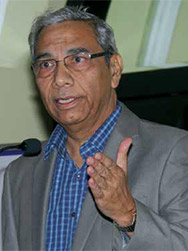
Towards Gautam City
Gautam Chatterjee, a former state government bureaucrat, was recently made the Chairman of the Maharashtra Real Estate Regulatory Authority (Maha RERA).
More recent to the day he took office, he was invited by the Rotary Club of Bombay to speak about RERA (Real Estate Regulation & Development Act). However, due to the thunderstorms in Mumbai, he had to decline the invitation.
The second invitation reached him at a time when he had “completed two-quarters of the implementation of RERA,” and the monsoons were over. The speaker thus gladly accepted the invitation once more, thereafter attending a Tuesday meeting that was not interrupted by a thunderstorm, but, at welldeserved intervals, bouts of thunderous applause.
That he and his colleagues managed to get the consent of the entire nation toaward a regulated system of development, is yet unfathomable. However, as is often said about positive government resolutions, “they are not making any headway because the implementation of the act is poor.” In many ways, alleged the speaker, the same reason resulted in the failure of MOFA (Maharashtra Ownership Flat Act, 1963).
MOFA was the only other act that tried to regulate the real estate sector. In comparison to RERA, one notices a careful attempt to improve upon the failings of the earlier effort by making use of modern technology, aiming to bring about “a feeling of trust between the home buyer and developer.”
The four basic pillars of RERA are as robust as the Rotary’s four-way test, said Gautam Chatterjee. At the very outset, the act aims to bring about transparency after reorganising the information asymmetry. Next, it strives for fiscal discipline, which was not the case earlier; developers would collect money from the buyers and start investing it elsewhere, even before completing the project for which the money was collected in the first place. Thirdly, individual accountability was lacking among developers, real estate agents, buyers, financiers, and even the city’s Municipal Corporation. Last but not the least, the act encourages a compliance among all those involved in the realty sector.
Looking back at a city governed by MOFA, and looking toward a “Gautam City,” lends clarity to the argument that Gautam Chatterjee sums up: “We are not a strangulating authority, but a regulating authority that is trying to build the trust that was somehow lost between the developer and home buyer.”
For example, earlier, grievance redressal was a very painful process, however, out of the 1,100 grievances that come under the purview of RERA, 300 have already been disposed in an amicable manner over the period of two quarters. Besides, by making developers share, in detail, the progress of their projects in the public domain, RERA takes advantage of today’s information technology.
These advantages over an outdated act also highlight the challenges that will be encountered in the years to come. Some of the obstacles that have already begun to surface are a lack of digital proficiency among the stakeholders, the unavoidable “pains of transition,” and, since the act accepts grievances related to past projects that could not be completed, “a legacy issue.”
Thus, a question that many Rotarians have asked through expression, and by expression, was about the future of RERA. Would the act still be implemented just as well as it is being implemented under his chairmanship? He answered: “The systems that we are trying to put in place, I think, are so robust that not even a demon would be able to demolish it.”
